北师大版高中英语必修一Unit3Celebrationlesson2word教案
- 格式:doc
- 大小:106.50 KB
- 文档页数:3
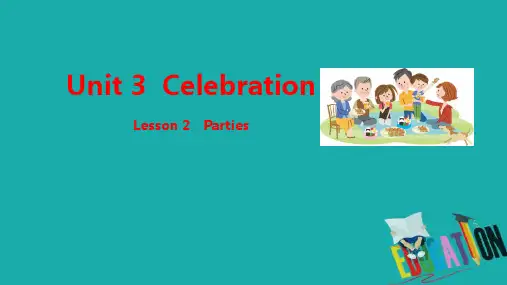
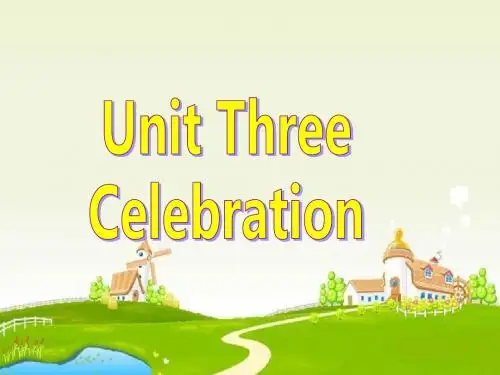
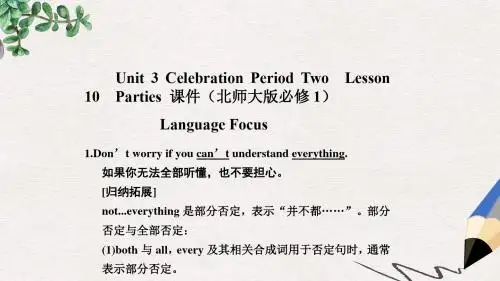
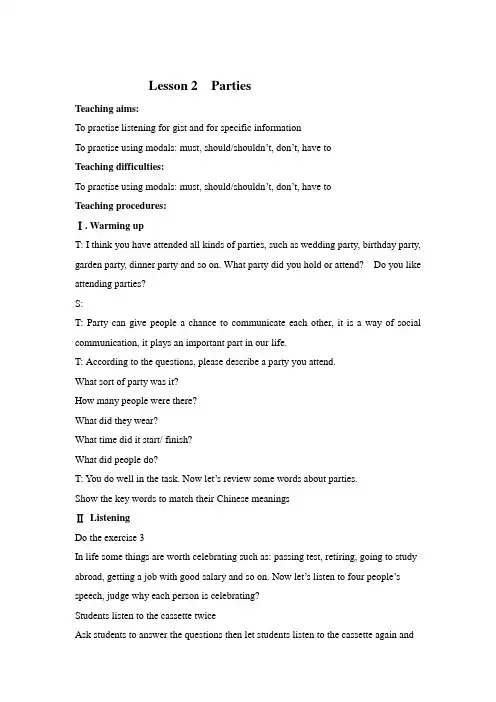
Lesson 2 PartiesTeaching aims:To practise listening for gist and for specific informationTo practise using modals: must, should/shouldn’t, don’t, have toTeaching difficulties:To practise using modals: must, should/shouldn’t, don’t, have toTeaching procedures:Ⅰ. Warming upT: I think you have attended all kinds of parties, such as wedding party, birthday party, garden party, dinner party and so on. What party did you hold or attend? Do you like attending parties?S:T: Party can give people a chance to communicate each other, it is a way of social communication, it plays an important part in our life.T:According to the questions, please describe a party you attend.What sort of party was it?How many people were there?What did they wear?What time did it start/ finish?What did people do?T: You do well in the task. Now let’s review some words about parties.Show the key words to match their Chinese meaningsⅡListeningDo the exercise 3In life some things are worth celebrating such as: passing test, retiring, going to study abroad, getting a job with good salary and so on. Now let’s listen to four people’s speech, judge why each person is celebrating?Students listen to the cassette twiceAsk students to answer the questions then let students listen to the cassette again andpause in each paragraph.Do the exercise 4When we attend a party we should follow social customs. what do you think should we do in parties?S:Now read through the advice, trying to complete the sentences and predicting what the answers will be.We will listen to about advice about how to behave in parties. (play the cassette for students to check their answers.ⅣSpeakingDo the exercise 5and 6Suppose you have a foreign friend who receives a invitation to a party.What to wear; What presents to take , When to arriveWhat to say, What not to do, When to leave,Divide students into groups to do the exerciseDo the exercise 7Ask students to match the expressions with different situation.ⅤHomework。
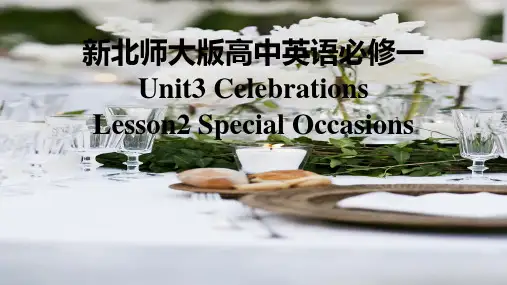
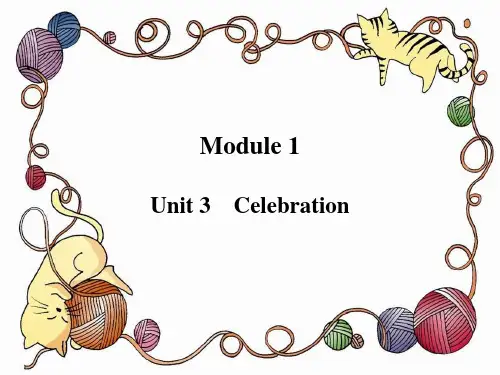
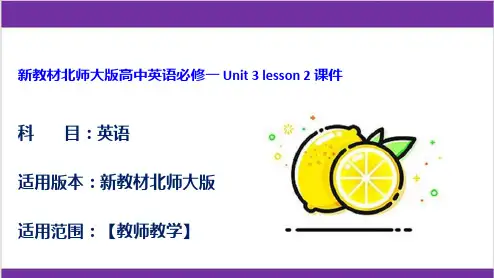
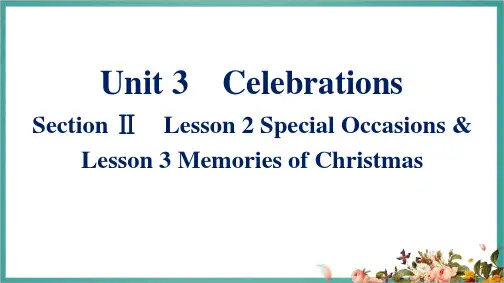
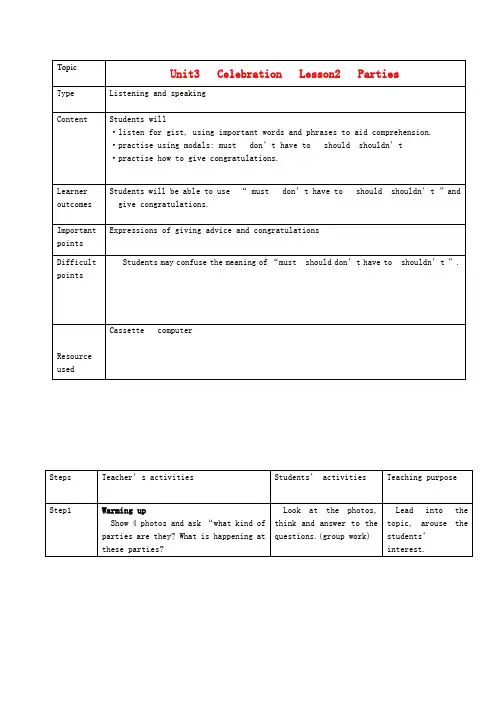
TopicUnit3 Celebration Lesson2 PartiesType Listening and speakingContent Students will·listen for gist, using important words and phrases to aid comprehension.·practise using modals: must don’t have to should shouldn’t·practise how to give congratulations.Learner outcomes Students will be able to use “ must don’t have to should shouldn’t ”and give congratulations.ImportantpointsExpressions of giving advice and congratulationsDifficultpointsStudents may confuse the meaning of “must should don’t have to shouldn’t ”.ResourceusedCassette computerSteps Teacher’s activities Students’ activities Teaching purposeStep1 Warming upShow 4 photos and ask “what kind of parties are they? What is happening atthese parties?Look at the photos,think and answer to thequestions.(group work)Lead into thetopic, arouse thestudents’interest.Step2 Pre-listening1.Show some new words on the computer and let the stud ents learn and remember them.e the key words to complete the sentences.(Ex2 on P38).3.Show some listening strategies to the students. 1.learn and remember thenew words.plete thesentences.3.Learn some listeningstrategies.(individual)The students canuse the words in theclass.In the listening,the students can usethe listeningstrategies.Step3 While-listening1. Play the first listening materialsto the students. Ask the students to do Ex3 on P38.2. Elicit from the students the difference in meaning between must and should by using examp les. Ask the students to complete the sentences.(Ex4 on P40).3. Play the cassette for students to check their answers. 1.Listen to the cassettetwice and decide why eachperson is celebrating.2.Try to complete thesentences.(pair work)3.Listen and check theiranswers.Make sure that thestudents understandthe listeningmaterials.Train thestuden ts’listeningabilities.Step4 Post-listeningAfter the second listening materials,ask students how they think the speakercontinued.Thin k what the speakerwill say as much aspossible and speak themout .Check theunderst anding ofthe students to thecontext .Step5 Pre-speakingLet t he students match theexpressions in the Function File withthese situations.(Ex7 on P39).Match the expressionsin the Function File withthese situations.(individual or pair work)Let the studentsknow how to givecongratulations.Step6 While-speaking1.Let the students think if a foreignvisitor is invited to a celebration inChina, what advice can you give him?Give the students some hints.2. Show the four photos again to thestudents, let the students choose oneand make a dialogue according to thegiven situations.3.Ask several pairs to act out theirdialogues.1.Think and discussit.(gr oup work).2.Make a dialogueaccording to the givensituations. (pair work)3.Act out theirdialogues.Lead to the topicTrain thestudents’speakingabilities.Check how well thestudents do.Step7 Post-speakingAsk the students to evaluate thespe aking.Evaluate the speaking.Self-evaluation,learn from eachother.Homework Assigning homework.Ask the students to write a dialogue:Student A is a foreign friend who isinvited to a celebration in China.Student B gives advice.Do the homework. Consolidate whatthey have learned.。
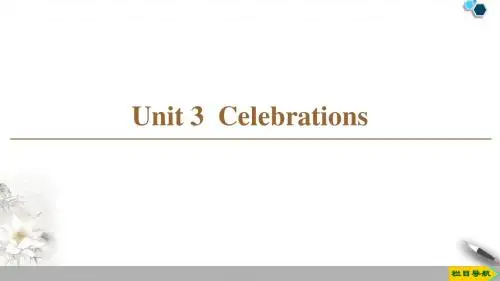
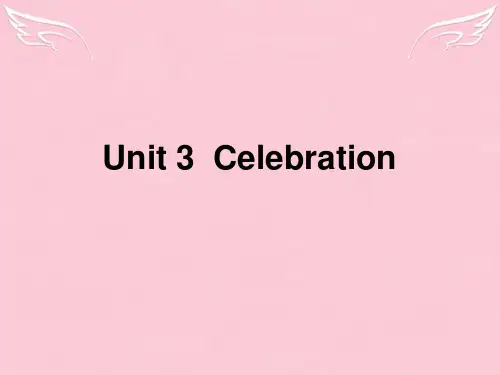
UNIT 3 CelebrationⅠ学习目标单词Warm-upgraduation, the Mid-Autumn Festival, wedding, the Dragon Boat Festival, turkey, puddingLesson 1celebration, power, darkness, tradition, include, destroy, decorate, boil, serve, seasonal, traditional, sticky, nowadaysLesson 2alcohol, barbecue, reception, salary, teenager, congratulation, retire, smartly Lesson 3bride, bridegroom, best man, entrance, invitation, ceremony, contribute, link Lesson 4decoration, adult, polar, seriouslyCommunication Workshopanniversary, mess, unfortunately短语Lesson 1burn down , take part inLesson 2apply forLesson 3even if, ought toLesson 4the North Pole, put up, blow up, carry on Communication Workshop a bit of, as well句型The festival is celebrated by... It is said/believed that sb. / sth交际用语Giving adviceYou ought to... You ought not to... You have to... You don't have to... CongratulationsWell done! You play beautifully!Wow ! That's brilliant!语法被动语态情态动词have to,should,can及情态动词ought toⅡ质量检测形成性检测一、词组互译A.英译汉:1.hold a celebration________________ 2.after graduation________________ 3.traditional Chinese medicine ________ 4.reception desk________________5.a letter of invitation ________________ 6.congratulate sb. on sth._____________ 7.even if ________________ 8.make contributions to________________ 9.go to church ________________ 10.dress up________________B.汉译英:1.中秋节________________ 2.元宵节________________3.端午节________________ 4.春节________________5.农历月份________________ 6.向……要求________________7.已婚________________ 8.用……来装饰________________ 9.从……毕业________________ 10.参加________________二、用括号里词的适当形式填空1.The old man told us a story passed on by oral ________.(traditional)2.Ten people were injured in the fire, ________ (include) two babies.3.The stars came out as soon as ________ fell. (dark)4.This boy is very ________; he may be another Edison. (smartly)5.Shall we ________ them back after the theatre? (invitation)6.His illness was more ________ than the doctor first thought. (seriously)7.I need one more strip of cloth to finish this ________ (decorate)8.________, I missed the last train. (forturately)9.After ________ she became a teacher. (graduate)10.Sitting out here, you really can feel the ________ of the sun. (powerful)三、单项选择1.The maths problem can be.________A.easy worked out B.easy to be worked outC.easily worked out D.easily to work out2.The Dragon Boat Festival ________ the beginning of the hottest season of the year.A.marks B.makes C.falls D.comes3.They stole everything in my purse, ________ my credit card.A.included B.to include C.was including D.including4.________ the morning of the wedding ceremony, the bride and groom have to serve tea to their parents.A.In B.At C.To D.On5.The best man will ________ and toast the bride and groom at the banquet.A.make a speech B.receive an invitationC.contribute some money D.attend a reception6.— I am going to get married, David.—.________A.You lucky thing!B.Well done! It's brilliant.C.That's brilliant! When's the big day?D.I am very sorry to hear that.7.Sir, you ________ be sitting in this waiting room. It is for women and children only.A.won't B.needn't C.oughtn't to D.don't have to 8.Her sister ________ a rich man. They ________ for twenty years.A.married with; have married B.married to; have marriedC.married; have been married D.was married; have been married 9.— I'm taking my driving test tomorrow.— ________!A.Cheers B.Good luck C.Come on D.Congratulations 10.The game ________ two hours. At last, our team won the game.A.lasted B.kept on C.had on D.carried on11.I'm feeling much better now so you ________ call the doctor.A.mustn't B.can't C.needn't D.shouldn't 12.— Will you go to attend her party?— No, ________.A.even though invited to B.even if invited meC.if not invited me D.unless invited to go13.________ that Singapore is a beautiful country.A.It said B.It is said C.It is saying D.It had been said 14.—When ________ again?—When he ________, I'll let you know.A.will he come; will come B.will he come; comeC.he comes; comes D.will he come; comes15.“Do you have any clothes ________ today, Master?” asked the servant politely.A.to wash B.to be washed C.washing D.being washed四、完形填空When I turned 40, my husband secretly planned a surprise party for me. I'll never forget my feeling 1 I entered the restaurant and saw loving friends among flowers and music and a large display of photos.I hurried from one table 2 the next, greeting each guest. Then suddenly at the back of the room I caught sight of a gentle, smiling man with snow-white hair and a kind, blue-eyed woman on his arm.“Mom, dad,” my 3 became wide. They had flown to Los Angeles from Chicago just hours before. I burst into tears at the sight of these two who, more than 4 else, had taught me that being there for another person is the 5 gift we can give.A year later, my husband and I were invited to an unusual wedding. The night before the wedding, I decided to 6 my friends and beg off. “Kathy, this is Karen.”“You're7 , aren't you?” she brok e in, almost begging (乞求).I 8 and at that moment the sight of my parents at my 40th-birthday party came into my mind.“Yes, of course,” I said. “We'll be there.”So we 9 And I was grateful we did. We weren't in our seats a minute before Kathy came up, happy but with 10 She told me how much our presence meant to her. Kathy's parents didn't make it as well as her son. I saw 11 in her eyes.I see now that one's presence 12 be a duty. It is, in fact, something that we owe one another, whatever the 13 To be there—in person—for the sad or happy events of our friends and dear ones makes 14 .When we are truly 15 for other people, important things happen to them and to us. We are renewed in love and friendship.1.A.though B.when C.if D.since2.A.to B.in C.at D.on3.A.nose B.forehead C.eyes D.ears 4.A.everybody B.nobody C.somebody D.anybody 5.A.heaviest B.cheapest C.smallest D.greatest 6.A.call B.help C.visit D.join 7.A.driving B.coming C.going D.returning 8.A.resisted B.prayed C.hesitated D.refused9.A.had B.went C.waited D.were 10.A.tears B.surprise C.smiles D.pride 11.A.puzzle B.comfort C.hurt D.honor 12.A.must B.can C.may D.would 13.A.prize 13.wage C.bill D.cost14.A.a problem 13.an opportunity C.a difference D.an impression 15.A.present B.happy C.thankful D.eager五、阅读理解AThis dictionary tells you about English words and how to use them in reading, writing and speaking English. It not only gives the meaning of words, it can also help you with spelling, word building, grammar and pronunciation.To use your dictionary correctly, you will find two spellings for this word. “Colour” is used in British English, while “color” is used in American English. When there are differences between British and American spelling, the dic tionary shows it with the word “BrE” for British English and “AmE” for American English.The dictionary also helps you pronounce words correctly. If you turn to the inside back face, you will see all the phonetic letters (音标) with some words to show you how they are pronounced. Just look at the inside back cover when you're not sure how to say a word.The most important reason for using a dictionary is to find out the meaning of a word — its definition.In this dictionary, the definitions have been written using only 2, 000 words. This means that the definitions of even the most difficult words are simple and easy to understand.1.________ of the words in the dictionary have two spellings.A.All B.Some C.Few D.One2.What is the main reason for us to use a dictionary?A.To read the word correctly.B.To write the word out.C.To know the meaning of the word.D.To find the difference between British English and American English.3.The phonetic letters helps you ________ each word correctly.A.say B.write C.understand D.know4.The Chinese meaning of “definition” here is________.A.词性B.词条C.词义D.词库5.How many words are there in this dictionary?A.Two thousand.B.One thousand.C.One hundred.D.We don't know.B阅读下面短文,从方框中选出每部分恰当的标题。
Topic
Unit3 Celebration Lesson2 Parties
Type Listening and speaking
Content Students will
·listen for gist, using important words and phrases to aid comprehension.
·practise using modals: must don’t have to should shouldn’t
·practise how to give congratulations.
Learner outcomes Students will be able to use “must don’t have to should shouldn’t ”and give congratulations.
Important
points
Expressions of giving advice and congratulations
Difficult points Students may confuse the meaning of “must should don’t have to shouldn’t ”.
Resource
used
Cassette computer
Steps Teacher’s activities Students’ activities Teaching purpose
Step1 Warming up
Show 4 photos and ask “what kind of parties are they? What is happening at
these parties?
Look at the photos,
think and answer to the
questions.(group work)
Lead into the
topic, arouse the
students’
interest.
Step2 Pre-listening
1.Show some new words on the computer
and let the stud ents learn and
remember them.
e the key words to complete the
sentences.(Ex2 on P38).
3.Show some listening strategies to
the students. 1.learn and remember the
new words.
plete the
sentences.
3.Learn some listening
strategies.
(individual)
The students can
use the wor ds in
the class.
In the
listening, the
students can use
the listening
strategies.
Step3 While-listening
1. Pl ay the first listening
materials to the students. Ask the
students to do Ex3 on P38.
2. Elicit from the students the
difference in meaning between must and
should by using examp les. Ask the
students to complete the
sentences.(Ex4 on P40).
3. Play the cassette for students
to check their answers. 1.Listen to the
cassette twice and
decide why each person
is celebrating.
2.Try to complete the
sentences.(pair work)
3.Listen and check their
answers.
Make sure that
the students
understand the
listening
materials.
Train the
studen ts’
listening
abilities.
Step4 Post-listening
After the second listening
materials, ask students how they think
the speaker continued.
Thin k what the
speaker will say as much
as possible and speak
them out .
Check the
underst anding of
the students to the
context .
Step5 Pre-speaking
Let t he students match the expressions in the Function File with
these situations.
(Ex7 on P39).
Match the expressions
in the Function File
with these situations.
(individual or pair
work)
Let the students
know how to give
congratulations.
Step6 While-speaking
1.Let the students think if a
foreign visitor is invited to a
celebration in China, what advice can
you give him? Give the students some
hints.
2. Show the four photos again to the
students, let the students choose
one and make a dialogue according to
the given situations.
3.Ask several pairs to act out their
dialogues. 1.Think and discuss
it.(gr oup work).
2.Make a dialogue
according to the given
situations. (pair work)
3.Act out their
dialogues.
Lead to the topic
Train the
students’
speaking
abilities.
Check how well the
students do.
Step7 Post-speaking
Ask the students to evaluate the
spe aking.
Evaluate the speaking. Self-evaluation,
learn from each
other.
Homework Assigning homework.
Ask the students to write a
dialogue: Student A is a foreign
friend who is invited to a celebration
Do the homework. Consolidate what
they have learned.。